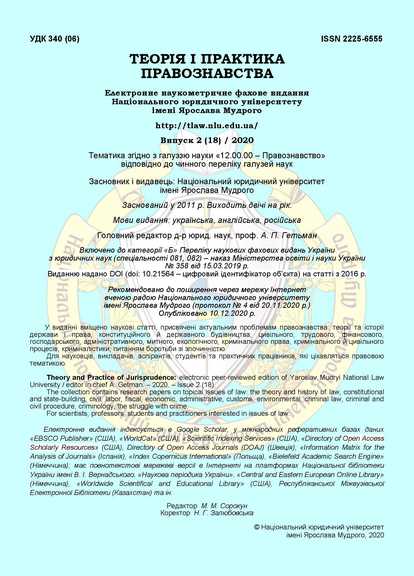Audio and video recordings as a type of electronic evidence in civil proceedings
DOI:
https://doi.org/10.21564/2225-6555.2020.18.218694Keywords:
justice, civil judicial proceedings, sound recordings, video recordings, court evidence, private life, judicial practiceAbstract
The scientific article presents the results of the study of the procedural features of the collection, study and evaluation of audio and video recordings as court evidence in civil proceedings. The process of formation and perception of audio and video recordings as court evidence is studied, their role and significance in the process of court evidence are determined. The prevailing in the legal literature, the views of scholars on the affiliation of audio and video recordings to a particular type of evidence, in particular as a type of written evidence, as a type of physical evidence, as a separate independent type of evidence.
The issue of using audio and video recordings as evidence in the process of judicial evidence in civil cases, in particular the question of the legality of its receipt by the party in the case leads to doubts about the admissibility of using these materials as court evidence. It is established that the objection of a party to the trial against the use of audio or video recordings made without their permission as evidence in a particular case, with reference to the violation of their right to respect for private life, raises the question of the admissibility of such evidence. The procedure for the use of video recordings obtained as a result of video surveillance at the workplace and sound recordings of business negotiations in the process of judicial evidence has been established. Some aspects of the legality of obtaining a video of an offense for submission to the court as evidence are explained.
The legal positions of the European Court of Human Rights and the Constitutional Court of Ukraine on the possibility of using video surveillance data in the workplace in the process of judicial evidence are studied and it is established that business, professional activity of an individual can be considered as part of his private life. negotiations should be considered an interference with a person's private life. Four circumstances have been identified that the court must establish in determining the admissibility of a video made in the workplace as evidence in court. It is established that the systemic unity of these circumstances allows the court to conclude on the admissibility or inadmissibility of such a video as evidence in courtReferences
Molchanov, V.V. (2012). Osnovy teorii dokazatel'stv v grazhdanskom processual'nom prave. Moscow: IKD «Zercalo-M» [in Russian].
Luk'yanova, I.N. (2003). Dokazatel'stva v arbitrazhnom processe. Extended abstract of candidate’s thesis. Moscow [in Russian].
Reshetnikova, I.V. (2000). Kurs dokazatel'stvennogo prava v rossijskom grazhdanskom sudoproizvodstve. Moscow: NORMA [in Russian].
Treushnikov, M.K. (1982). Dokazatel'stva i dokazyvanie v sovetskom grazhdanskom processe. Moscow: Izdatel'stvo Moskovskogo universiteta [in Russian].
Pro vnesennia zmin do Tsyvilnoho protsesualnoho kodeksu Ukrainy: Zakon Ukrainy vid 21.06.2001 r. № 2540-III. (2001). Vidomosti Verkhovnoi Rady Ukrainy, 39, art. 190.
Tsyvilnyi protses Ukrainy. Ye.O. Kharytonov, O.I. Kharytonova, N.Yu. Holubieva (Eds.). Kyiv: Istyna [in Ukrainian].
Vasil'ev, S.V. (2006). Grazhdanskij process Ukrainy. Khar'kov: OOO «Odissej» [in Russian].
Zeleniak, A.S. (2014). Vykorystannia rechovykh dokaziv pid chas rozghliadu ta vyrishennia tsyvilnykh sprav. Candidate’s thesis. Uzhhorod [in Ukrainian].
Lazko, O.M. (2015). Rechovi dokazy u tsyvilnomu protsesi Ukrainy: pytannia teorii i praktyky. Nashe pravo, 1, 121–126 [in Ukrainian].
Koliadenko, P.L. (2016). Pravovyi rezhym elektronnoho informatsiinoho resursu sudovoho zasidannia v informatsiinomu suspilstvi. N.A. Savinova (Ed.). Kyiv: NDIIP NAPrN Ukrainy [in Ukrainian].
Bonner, A.T. (2008). Audio- i videozapisi kak dokazatel'stvo v grazhdanskom i arbitrazhnom processe. Zakonodatel'stvo, 3, 79–87 [in Russian].
Korotkij, S.A. (2009). Sootnoshenie audio- i videozapisej s pis'mennymi dokazatel'stvami v grazhdanskom processe. Nauchnye vedomosti, 10 (65), 131–137 [in Russian].
Konstytutsiia Ukrainy: Zakon Ukrainy vid 28.06.1996 r. № 254k/96-VR. (1996). Vidomosti Verkhovnoi Rady Ukrainy, 30, art. 141.
Konventsiia pro zakhyst prav liudyny i osnovopolozhnykh svobod vid 04.11.1950 r. (2001). Holos Ukrainy – Voice of Ukraine, 10 January, 3.
Rishennia Konstytutsiinoho Sudu Ukrainy vid 20 sichnia 2012 r. № 2-rp/2012. (2012). URL: https://zakon.rada.gov.ua/laws/show/v002p710-12#n51.
Tsyvilnyi protsesualnyi kodeks Ukrainy : Zakon Ukrainy vid 18.03.2004 r. № 1618-IV. Vidomosti Verkhovnoi Rady Ukrainy. 2004. № 40-41,42. St. 492.
Tsyvilnyi kodeks Ukrainy: Zakon Ukrainy vid 16.01.2003 r. № 435-IV. (2003). Vidomosti Verkhovnoi Rady Ukrainy, 40-44, art. 356.
Rishennia Yevropeiskoho sudu z prav liudyny u spravi «Vukota-Bojić v. Switzerland» vid 18.10.2016 r. (zaiava № 61838/10). (2016). URL: http://hudoc.echr.coe.int/eng?i=001-167490.
Rishennia Yevropeiskoho sudu z prav liudyny u spravi «Köpke v. Germany» vid 05.10.2010 r. (zaiava № 420/07). (2010). URL: http://hudoc.echr.coe.int/eng?i=001-101536.
Rishennia Yevropeiskoho sudu z prav liudyny u spravi «Perry v. the United Kingdom» vid 17.07.2003 r. (zaiava № 63737/00). URL: http://hudoc.echr.coe.int/eng?i=001-61228.
Rishennia Yevropeiskoho sudu z prav liudyny u spravi «Oleksandr Volkov v. Ukraine» vid 09.01.2013 r. (zaiava № 21722/11). (2013). URL: http://hudoc.echr.coe.int/eng?i=001-115871.
Rishennia Yevropeiskoho sudu z prav liudyny u spravi «Kennedy v. the United Kingdom» vid 18.05.2010 r. (zaiava № 26839/05). (2010). URL: http://hudoc.echr.coe.int/eng?i=001-98473 (data zvernennia: 21.10.2020).23.
Mishina A. Audiozapis' kak dokazatel'stvo. URL: https://www.buhgalteria.ru/ article/audiozapis-kak-dokazatelstvo [in Russian].
Pavlushina, A.A., Fedyashova, A.N. (2012). Osobennosti ocenki audio- i videodokazatel'stv i inyh dokumentov i materialov v grazhdanskom i arbitrazhnom processe. Vestnik Samarskogo gosudarstvennogo ekonomicheskogo universiteta, 7 (93), 71–76 [in Russian].
Prosvirin, A. (2019). Audiozapis' kak sredstvo dokazyvaniya v grazhdanskom processe ‒ effektivno ili net? URL: https://zakon.ru/blog/2019/03/06/audiozapis_kak_sredstvo_ dokazyvaniya_v_grazhdanskom_processe_-_effektivno_ili_net [in Russian]
Downloads
Published
How to Cite
Issue
Section
License
Copyright (c) 2020 Сергій Анатолійович Чванкін

This work is licensed under a Creative Commons Attribution 4.0 International License.




